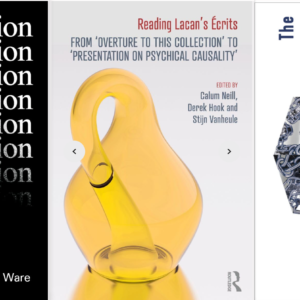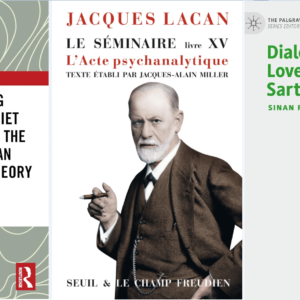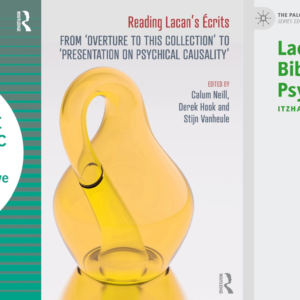News – March 2024
20% off and free global shipping on all Routledge titles for LacanOnline.com readers. Use this link and code S031 at the checkout.
The English translation of Lacan’s Seminar XVIII, On a Discourse that Might Not be a Semblance, has been announced for publication in November. Translated by Bruce Fink, it is available for pre-order now via Amazon or publishers Polity. It is in this Seminar, given over the academic year 1970-1971, that Lacan re-theorises the sexual relation (or, later, the lack of it), attempting to ascribe to it a logic. The ‘semblance’ of the Seminar’s title is one which the sexualised being exhibits, in signifying displays, which both mask and manifest the real of jouissance. It is also the ‘semblance’ involved in analytic work itself. Like the role of the oracle in the great myth of Oedipus, the analyst’s enunciations have a “cutting edge” that brings about truth through semblance: “Interpretation is not put to the test of a truth that can be settled by a yes or a no, it unleashes truth as such.” (Session of 13th January 1971, my translation).
Lacan’s Premier Ecrits [First Writings] has also been announced to be published in English translation by Polity later this year. This slim collection is translated by Russell Grigg and contains some of the early papers from Lacan’s time as a psychiatrist. They include papers on the structure of paranoid psychosis, schizophrenic writing, and the infamous crimes of the Papin sisters. Already we can notice in these works Lacan’s interest in the specificity of a case, the singularity of each subject’s suffering, his proclivity to structure when describing psychical organisation, and the attention to the link between symptoms and creative practices. It is available to pre-order now via Amazon or publishers Polity.
Just published in the last month is Nathan Gorelick’s The Unwritten Enlightenment: Literature between Ideology and the Unconscious. The book traces the unconscious origins of the Enlightenment and the Enlightenment origins of the unconscious,and wagers a Lacanian critique of ideology by proposing a psychoanalytic ethics of reading. You can order direct from the publishers Northwestern University Press at 25% off with code NUP2024.
Also newly-announced for publication towards the end of this year is Youth Mental Health Crises and the Broken Social Link: A Freudian-Lacanian Perspective by Carl Waitz. Using Lacan’s thought to argue that this crisis is linked to the failure of rites of initiation and rites of passage in contemporary American society, Waitz also theorises the breakdown of shared civic identification in parallel with the growth of consumer capitalism and the rise of social media in the 21st century. This results, he argues in young people lacking a “reliable method of entering the social link through symbolic identification” and an inability to use such a link to bind libido. It will be published by Routledge in October.
On YouTube, Lacan Salon has uploaded several new videos over the past month from its series of talks by Lacanian analysts and scholars. Alireza Taheri’s discussion of ‘The Late Modern Crisis of Sexuality’ looks at the contemporary crisis of credibility regarding the universality of social institutions, what it means for the ways sexual practices are regulated, and the cultural supports for sexual identity. Can psychoanalysis provide a path freed from the constraints of older fictions and yet also unfettered to new ideologies? Eve Watson’s presentation ‘An Exegesis of the Case Study in Teaching and Transmission in Psychoanalysis’ comments on the seeming incompleteness of case studies and clinical vignettes, and their suitability as a method of transmitting psychoanalytic practice. Referenced in Watson’s talk is the thought-provoking paper by Ian Parker, ‘The Psychoanalytic Clinical Case Presentation, the Case Against’ which is available in the journal Lacunae, issue 17. Leon Brenner’s talk ‘From Signs to Signifiers: Art and Language in Autism’ puts forward the proposition that autism results from the spontaneous refusal of the subject to engage with the language of others, or the refusal of alienation in language. Lastly on Lacan Salon’s channel, Dan Collins presents an exploration of ‘Jacques Lacan’s Middle Seminars’ with a focus on Seminars XII and XIII. Collins sees Lacan’s work across Seminars XII, XIII, XIV and XV as an engagement with the question: where is the subject? This is a two-part talk, and the second part is also now available. Check out the schedule of other upcoming events from the Vancouver-based Lacan Salon on their site.
The Ecole de la Cause freudienne continues to upload a range of videos from its Studio Lacan series. But there is also a treasure trove of Jacques-Alain Miller’s talks dating back to the late 1980s that are being added, all of which are available with English subtitles. In particular in the last month, from the 1989 Granada Conference is Miller’s ‘Une éthique sans surmoi’ [‘Ethics with the superego’]. Here, Miller elaborates the Freudian paradox that any renunciation of the drive feeds the superego, so that moral will is only apparently opposed to the will to jouissance. For this reason it is possible to enjoy your symptoms even as you suffer from them. The ethics of a psychoanalysis, he argues, are not defined by renunciation but by the opposite – not giving in (referencing the end of Lacan’s Seminar VII).
Also on YouTube, Derek Hook interviews Sinan Richards in a two-part discussion of Lacan and Fanon. In the first part, Richards discusses Lacan’s theory of the mirror stage and Fanon’s comments on it in Black Skin, White Masks (which are mostly confined to a footnote towards the end of this work). In the second part, Richards considers the limits that Fanon saw in psychoanalysis – the latter’s critique of Octave Mannoni, and the extent to which psychoanalysis is able to deal with colonial pathologies or has a tendency to itself pathologise.
On the Rendering Unconscious podcast Betty Milan and Chris Vanderwees discuss Analyzed by Lacan: A Personal Account, the recently-published book translated by Vanderwees which contains Milan’s memoir of her analysis with Lacan in the 1970s, Why Lacan, and her play Goodbye Doctor which was inspired by this experience. Milan’s story, and in particular the play, have recently been adapted into the movie Adieu Lacan by Richard C. Ledes. An interview with Milan by the late Mari Ruti is also included in the book.
The NLS Congress on the Clinic of the Gaze takes place in Dublin next month, 11th-12th May. Registration is open to attend in person or online. There is a special discounted rate for under-25s. A series of short videos or ‘capsules’ towards the conference are available on the NLS TV YouTube Channel. On Radio Lacan is also the podcast of Clotilde Leguil’s presentation to the ICLO-NLS in January on the theme of the Congress, ‘Vision as an Event in the Experience of Psychoanalysis.’ It is available in English.
More new translations of Lacan’s work this month on Richard G. Klein’s Freud2Lacan.com. Now available in English is the transcript of Lacan’s consultation with a patient who had been reporting a friend was controlling his thoughts via hypnosis (Présentation de Monsieur B. D(ray), number 108 on the Lacan page linked to above). Also available is Lacan’s paper ‘Theoretical introduction to the functions of psychoanalysis in criminology’, presented at the 13th Congress of French-speaking analysts on 29th May 1950 (number 46), and a summary by Lacan of his intervention there (number 47).
Finally, between 29th-30th May a specialist doctoral school course will run at the University of Ghent offering a close reading of Lacan’s Seminar IX: Identification. Led by Dr Christian Fierens, it will look closely at Lacan’s Seminar on this topic, the theoretical underpinnings of the concept, and more philosophical questions about the nature of human subjectivity. Dr Fierens will lecture in French, but discussion in Dutch and English is welcome.
Got news? Get in touch.




Leave a Reply